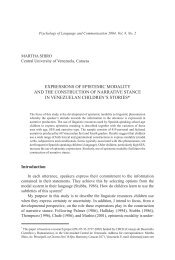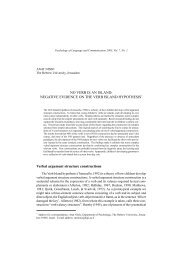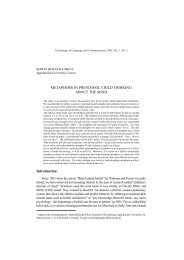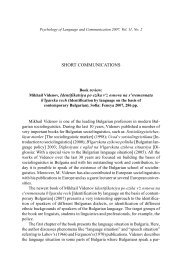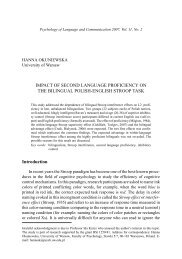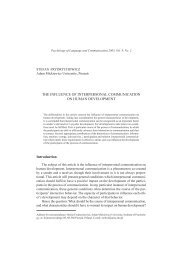The effecTs of groUP coNscioUsNess oN JAPANese lANgUAge ...
The effecTs of groUP coNscioUsNess oN JAPANese lANgUAge ...
The effecTs of groUP coNscioUsNess oN JAPANese lANgUAge ...
You also want an ePaper? Increase the reach of your titles
YUMPU automatically turns print PDFs into web optimized ePapers that Google loves.
90 Norie Mogi<br />
<strong>The</strong> Japanese consider a house as a private space where they can relax; therefore, a lock<br />
on the door is not necessary. <strong>The</strong>y call a house ie, “house” and uchi, “inside” or “house”<br />
Various expressions in In/Out-groups<br />
Aisatsu, “greetings” and kimarimonku, “fixed expressions” are also a sign <strong>of</strong> the uchisoto<br />
distinction. Mizutani (1979, p. 4) hypothesizes that Japanese greetings and fixed<br />
expressions are used by members <strong>of</strong> a certain group (see Table 3 in the Appendix). That is<br />
to say, whether the Japanese give and return greetings or not is related to group consciousness<br />
and is a matter <strong>of</strong> psychological distance. Psychological distance influences the use <strong>of</strong><br />
sayoonara, “good bye” and shitsurei shimasu, “excuse me”, but here means “good bye”.<br />
<strong>The</strong> former is used in the schools and the latter is more likely to be used in formal settings.<br />
Those who think that they are on the higher levels <strong>of</strong> hierarchy still think that sayoonara<br />
is impolite and get angry when others, who are below them, address them thus. Mizutani<br />
(1979, p. 154) says that he sometimes is unhappy when his students say sayoonara to him.<br />
Also, he heard that an old pr<strong>of</strong>essor at the university was furious when his student said to<br />
him sayoonara. University pr<strong>of</strong>essors or teachers traditionally have a high social status,<br />
and therefore they expect that students at the lower levels <strong>of</strong> the hierarchy should display<br />
respect. <strong>The</strong> use <strong>of</strong> sayoonara does not sound respectful.<br />
On the other hand, the closer the psychological distance between the Japanese, the<br />
less frequently they use greetings. Certainly, konnichiwa and konbanwa are never used<br />
in close relationships. <strong>The</strong> question arises: what do they say instead? In fact, they do not<br />
say anything. It depends on gender and generation <strong>of</strong> people; ah, yah, and oh can be used<br />
but rather by male speakers. Female speakers tend to smile, raise a hand, and give a little<br />
wave when they recognize people whom they know very well. Physical expressions in this<br />
specific situation are more important than uttering words. Apparently saying something<br />
draws a clear line amongst people, which means there is a certain degree <strong>of</strong> psychological<br />
distance between them. On the other hand, in a close relationship, saying something is<br />
no longer important. Also, the closer the relationship, the better people understand each<br />
other without words. Thus, the Japanese omit the first greeting. This may sound rude for<br />
non-native Japanese speakers but not for the Japanese. What seems strange and rude to the<br />
Japanese is the English greeting, since the speaker is not really interested in the hearer’s<br />
reply. “How are you?” is said but the speaker sometimes does not expect to hear a reply.<br />
This appears very rude to the Japanese because the speaker has asked a question <strong>of</strong> the<br />
hearer, but if the speaker does not expect an answer, there is no point to say it. This is rude<br />
and against the Japanese notion <strong>of</strong> caring for others.<br />
Remarks<br />
Emigration is the time for cross-cultural interaction. This is also the time to develop<br />
borderless societies. When the Japanese change their place <strong>of</strong> abode, they not only change<br />
their behavior but also their language. Yet their speech and their behavior are sometimes<br />
misunderstood by non-Japanese speakers. Interaction between the Japanese and others is<br />
the ongoing topic <strong>of</strong> my PhD thesis entitled: “Cross-cultural communication. Strategies<br />
<strong>of</strong> initiating and maintaining social interactions in Polish-Japanese dyads”.<br />
Japanese society is changing and the notion <strong>of</strong> Japanese group-consciousness seems to be<br />
changing as well. Although not as strongly as before, the idea still influences Japanese society.



